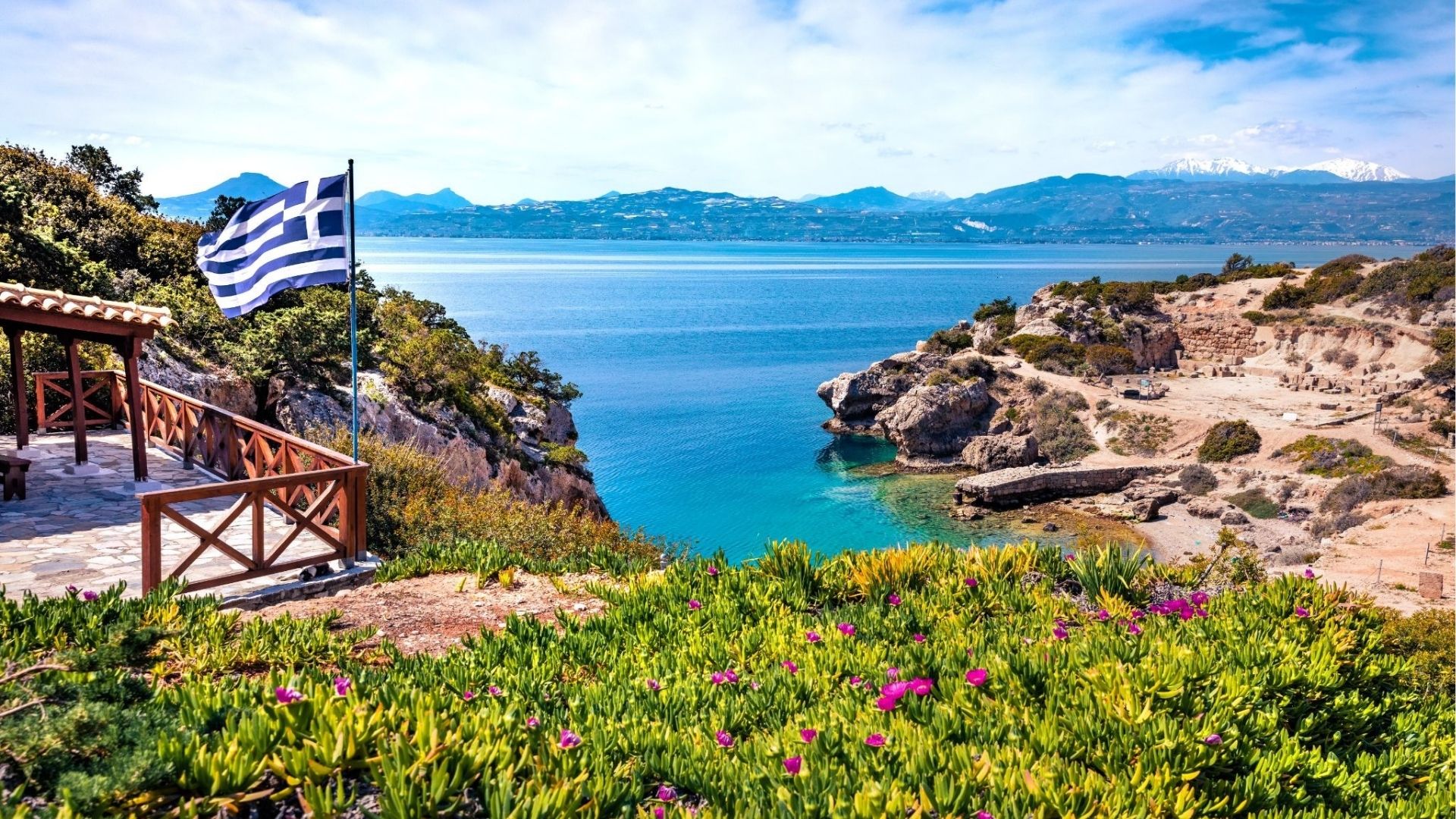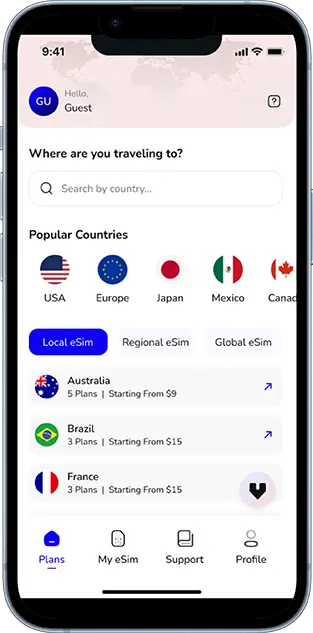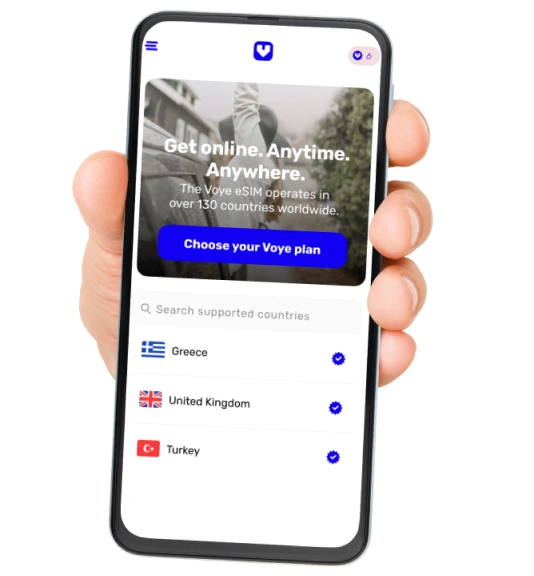Note that iPhone devices from Mainland China aren’t eSIM compatible. Also iPhone devices from Hong Kong and Macao aren’t compatible (except for iPhone 13 Mini, iPhone 12 Mini, iPhone SE 2020 and iPhone XS)
Greece has long been a favorite among travelers who crave a mix of history, coastline, and easygoing Mediterranean living. From the Acropolis views to Santorini sunsets, few countries offer such timeless appeal. But as global tourism evolves, Greece is making a few smart updates that travelers need to know about before packing their bags for 2026.
In 2026, the country isn’t changing its magic – it’s simply refining how visitors experience it. New entry requirements, sustainability-focused taxes, and small price adjustments are all part of Greece’s plan to balance growth and preservation. For travelers, it means a few extra steps before takeoff but a smoother, more organized journey once you land.
What’s New in Greek Travel for 2026?
ETIAS Authorization Launch
Starting in late 2026, travelers from visa-exempt countries, including the U.S., Canada, the U.K., and Australia, will need to complete an ETIAS authorization before entering Greece or any other Schengen Zone country.
It’s not a visa, but a pre-travel screening designed to make European travel safer and more efficient.
- Application: Online, takes just a few minutes.
- Fee: Around €20, valid for three years.
- Processing time: Usually within 24-72 hours.
- Delivery: You’ll receive approval via email.
Traveler Tip:
Apply a few weeks before your trip to avoid last-minute stress. You’ll get updates and confirmation online, so having reliable data connectivity while traveling is essential. A Voye Global eSIM for Greece ensures you can handle every step – from ETIAS updates to ferry bookings – without needing a physical SIM card or hunting for Wi-Fi.
Stay Connected Across Greece
Explore islands and cities with seamless data coverage everywhere.
Cruise Passenger Fee
From 2025 onward, and continuing into 2026, Greece will apply a Sustainable Tourism Fee for cruise passengers.
- Fee range: €5 to €20 per person, depending on the port and time of year.
- Applies to: Major destinations like Santorini, Mykonos, Rhodes, and Corfu.
This initiative helps support island infrastructure and environmental protection, especially in high-traffic areas.
If you’re booking a cruise, check whether this fee is already included in your package. Many large cruise companies now add it automatically, while smaller operators may collect it on arrival.
Hotel and Accommodation “Climate Resilience” Fee
As part of Greece’s commitment to sustainable tourism, hotels and short-term rentals now include a climate resilience tax. This fee supports eco-projects, renewable energy, and local tourism management.
- Range: €1.50 to €10 per night, based on hotel class and season.
- How it’s charged: Usually included in your booking total or collected at check-in.
For travelers, it’s a small contribution that directly supports Greece’s efforts to protect the very landscapes and beaches you’ve come to enjoy.
How Much Will a Trip to Greece Cost in 2026?
Prices in Greece have risen slightly, reflecting inflation and tourism management costs, but the country remains one of the most affordable in Western Europe.
Here’s what you can expect for average daily expenses per person:
| Category | Average Cost (per day/person) |
| Accommodation | €80–€120 |
| Meals & Drinks | €30–€60 |
| Ferry Tickets | €30–€90 |
| Attractions / Entry Fees | €15–€25 |
| Local Transport | €2–€10 |
| eSIM or Data Plan | from €8 for 5GB |
Traveler Insight:
If you’re used to destinations like Italy or France, Greece still feels like a bargain. A seaside taverna dinner with local wine can cost under €25, and many archaeological sites remain affordable or even free on certain days of the month.
For budget-conscious travelers, visiting in April-May or September-October offers lower prices, fewer crowds, and ideal weather for both sightseeing and beaches.
Smart Tips for Stress-Free Greece Travel
Book Early
Ferries, boutique hotels, and popular island routes sell out quickly during peak months (July-August). Booking at least 2-3 months in advance ensures better rates and flexibility.
Keep all booking confirmations and digital tickets on your phone – and with an eSIM, you can access them instantly without depending on hotel Wi-Fi or foreign data cards.
Stay Connected Easily
Greece’s islands are beautiful, but can be unpredictable when it comes to Wi-Fi. Skip the hassle of searching for SIM cards upon arrival. Instead, activate a Voye Global eSIM Greece before you fly.
It gives you instant connectivity across all major islands and cities, including Santorini, Athens, Crete, Paros, and Naxos. No paperwork, no queues, and no roaming fees. You simply scan, activate, and stay connected from the moment you land.
Travel Light
Greek ferries often have strict luggage limits (usually 20kg checked bags and small carry-ons). Domestic flights can also charge extra for heavier bags.
Stick to lightweight, breathable clothes, and invest in quick-dry fabrics. You’ll thank yourself when you’re climbing the steps in Santorini or navigating narrow alleyways in the Cyclades.
Eat Local
The best Greek meals are found in local tavernas where families cook traditional recipes. Meals here are not only cheaper (often 30-40% less than tourist spots) but also more authentic.
Try dishes like moussaka, grilled octopus, dolmades, and loukoumades – small honey-drenched doughnuts that are irresistible after a long day of sightseeing.
Get Around Smartly
Athens remains the transportation hub for most of Greece. From here, ferries and domestic flights connect you to dozens of islands daily.
For ferries, book directly on official Greek ferry websites or trusted platforms to avoid markups. For intercity travel on the mainland, KTEL buses are efficient and affordable.
Before leaving urban areas, download maps and travel apps using your eSIM. Cellular data is more reliable than Wi-Fi in remote villages and islands.
Underrated Destinations Worth Visiting in 2026

Naxos
Often overshadowed by its glamorous neighbors, Naxos offers long sandy beaches, mountain villages, and authentic Greek culture. It’s family-friendly and more affordable than Santorini, with excellent local food and easy access by ferry.
The Peloponnese
A perfect destination for a road trip – the Peloponnese region is dotted with ancient ruins, olive groves, and seaside villages. Explore Nafplio, Monemvasia, and Kalamata for a mix of history and coastal charm.
Paros
Ideal for couples or digital nomads, Paros blends the whitewashed Cycladic architecture of Mykonos with a calmer pace. Reliable connectivity and coworking cafés make it a great base for extended stays.
Meteora
This UNESCO site is one of Greece’s most breathtaking landscapes, with monasteries perched high atop natural rock pillars. Visit early in the morning for golden light and fewer crowds – and ensure your phone is ready for the photos you’ll take.
Want to explore more beyond the typical islands? Discover the best lesser-known spots and local favorites in our guide to Top Cities to Visit in Greece.
How to Budget and Plan Smarter in 2026?
Be Flexible with Dates
Shoulder seasons (spring and early fall) bring lower prices and cooler temperatures. You’ll also experience friendlier interactions with locals who have more time to engage outside of peak crowds.
Understand Local Fees
New tourism and climate fees may seem small, but they can add up. Budget an extra €50-€100 per traveler for taxes, ferries, and miscellaneous local charges.
Plan Smarter, Travel Easier
Get updates, maps, and bookings done instantly with your eSIM.
Keep Digital Copies
Store your passport, ETIAS, and ferry passes on your device and cloud backup. Reliable mobile data via an eSIM means you can access everything even without hotel Wi-Fi.
Learn a Few Greek Words
Simple greetings like “Kaliméra” (Good morning) or “Efcharistó” (Thank you) go a long way. Locals genuinely appreciate the effort and often respond warmly.
Common Mistakes to Avoid
- Booking too late: Prices surge in July-August.
- Ignoring travel insurance: Especially crucial for ferries and island-hopping itineraries.
- Overpacking: Ferry luggage limits are real.
- Relying on Wi-Fi: Connections can be slow on islands; use your eSIM for dependable data.
- Trying to see everything: Focus on a few destinations to truly relax and connect.
For a deeper look at what travelers often overlook, check out our detailed guide on Mistakes to Avoid in Greece – it’ll help you plan smarter and enjoy your trip stress-free.
Remember, Greece rewards slow travel. Spend a few days in one village, linger over long lunches, and let the pace of island life reset your rhythm.
Final Thoughts: Plan Smart, Travel Easy, and Enjoy Greece in 2026

Greece in 2026 is evolving in ways that make travel more sustainable, digital, and traveler-friendly. The introduction of ETIAS and local tourism taxes may sound bureaucratic, but in practice, they’re designed to make the country better prepared for global tourism’s next chapter.
Here’s what to keep in mind as you plan:
- Apply for ETIAS early once it officially launches.
- Plan your trip during the spring or fall for fewer crowds.
- Keep a small budget buffer for local fees and taxes.
- Use an eSIM for seamless connectivity from takeoff to touchdown.
- Explore beyond the well-trodden paths – Greece’s heart often beats strongest in its quiet corners.
With thoughtful planning, 2026 promises to be one of the best years to visit Greece. The sunsets will still glow over the caldera, the beaches will still sparkle under Aegean light, and the locals will still greet you with warmth that feels timeless.
Travel prepared, not pressured, and let Greece remind you what it means to truly slow down.
FAQs: Greece Travel in 2026
1. When will ETIAS become mandatory for Greece?
ETIAS is expected to launch by late 2026 for visa-exempt travelers entering the Schengen Zone.
2. How much is the new cruise passenger fee?
Between €5 and €20 per person, depending on the destination and season.
3. Is Greece still affordable in 2026?
Yes. Despite mild price increases, Greece remains a great value compared to other Western European countries.
4. Do I need to print my ETIAS confirmation?
It’s not required, but keeping a digital and paper copy is wise.
5. Can I use my eSIM on multiple Greek islands?
Yes, a Voye Global eSIM works across all Greek islands and cities without roaming fees.
6. What’s the best time to visit Greece in 2026?
Late April to early June or September to mid-October for the best balance of weather, prices, and crowds.

Seamless Mobile Data Everywhere

















